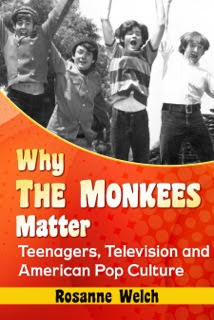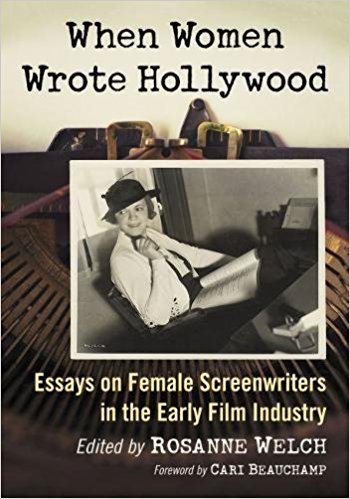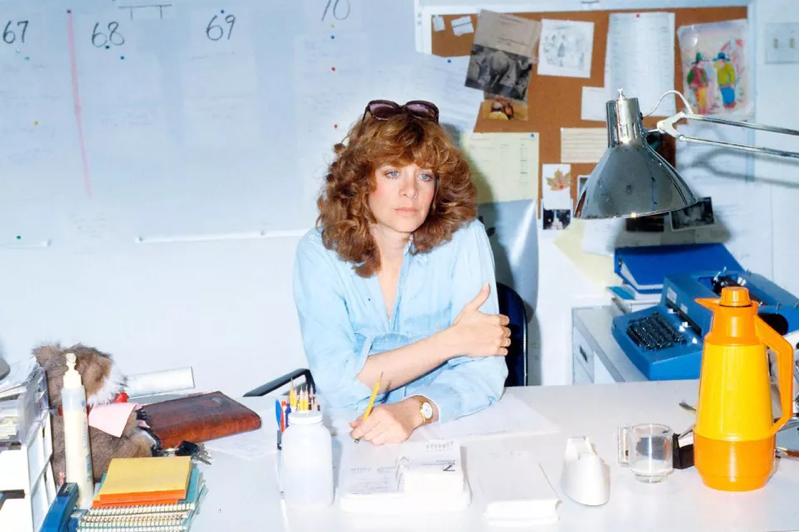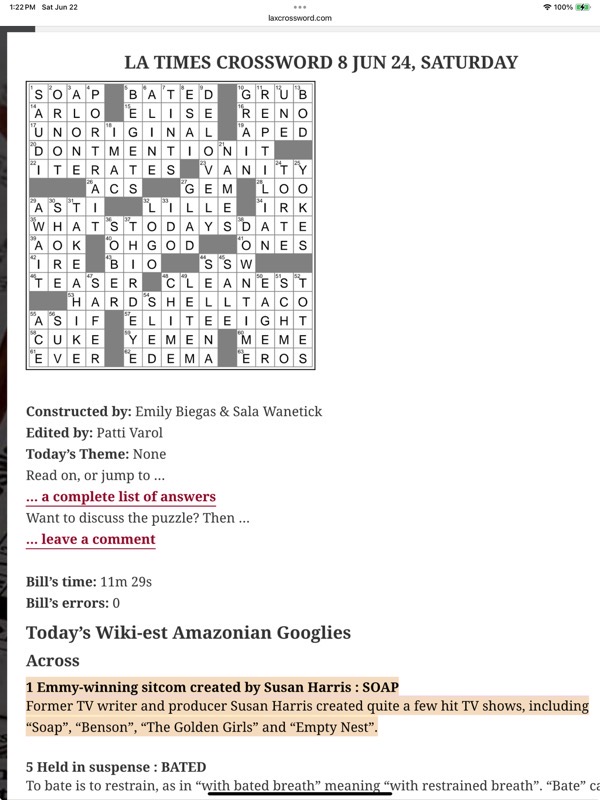Read From Silent Murder Mysteries to Andy Hardy’s Americana, Agnes Christine Johnston Wrote it All
Read about more women from early Hollywood
Podcast: Play in new window | Download
Subscribe: RSS
On Screenwriting and Media with Dr. Rosanne Welch
Writing, Film, Television and More!
Save 35% on McFarland Books – One of My Publishers is offering a 35% Discount on Their Catalog This Week!
Along with your other holiday shopping over this Thanksgiving weekend, I’m happy to pass along this lovely discount from McFarland Publishing, the fine folks who published two of my favorite books:
Why The Monkees Matter: Teenagers, Television and American Pop Culture

AND
When Women Wrote Hollywood: Essays on Female Screenwriters in the Early Film Industry

Direct from the McFarland site, From now through December 2, they are offering a full 35% off ALL of their titles with coupon code HOLIDAY24 at checkout.
See the entire McFarland Catalog
You can buy one of my books — or any other cool pop culture book you find — for yourself or anyone else on your gift list this year.
Happy Holidays!
Order from Bloomsbury | Amazon | Bookshop.org
I’m very proud to have a chapter in this new inaugural book in the Screen Storytellers collection covering The Works of Shonda Rhimes. Edited by Anna Weinstein, an Assistant Professor of Screenwriting at Kennesaw State University, the series is designed to do one of my favorite things – bust the outdated ‘auteur’ theory by bringing attention to the writers of the stories we have loved and watched – and rewatched – all our lives.
For this collection, my chapter focuses on how Rhimes’ shows come from the Humanism ideology even moreso than simply a feminist one, though that is what many people think. But Rhimes’ hired Dan Shapiro, chair of the College of Medicine’s humanities department at Penn State Hershey, as a consultant for her first two medical dramas Grey’s Anatomy (2005–) and Private Practice (2007–13). In this way, Rhimes was able to bring the real-world philosophy of medicine to her fictional hospitals, presenting authentic depictions of humanism to her audiences. One of the things I love about research is learning new things about people/shows/events I thought I already knew well.
The other exciting thing about this inaugural book arriving is that I have signed on to edit a similar book on The Works of Susan Harris so this book is my example of what that future project will feel like when it arrives in the mail!
Since there’s been so much talk this week about mothers being proud of their highly accomplished children it’s a wonderful week to share the link to the latest Writers Guild Foundation panel co-sponsored by the Stephens College MFA in TV and Screenwriting covering the topic of “Writing Females in Leadership Roles”.
Moderated by our Executive Director Dr. Rosanne Welch the panel includes three writers from shows that celebrate female leaders from the real-life 23-year-old Miep Gies who hid Anne Frank’s family to real-life First Ladies Eleanor Roosevelt, Michelle Obama, and Betty Ford to the fictional female leaders of Station 19. Many thanks to Joan Rater (A Small Light), Zora Bikangaga (The First Lady), and especially to our Stephens College MFA alum Alexandra Fernandez (Station 19) for joining us to discuss everything from our childhood role models of female leadership (mostly moms and aunties) to the traits we expect to see in our leaders, to the nuts and bolts of working in a television writers room.
If you haven’t yet watched Derry Girls you have to – This trailer to the first season shows the brilliance of creator Lisa McGee, who wrote ALL 3 seasons worth of episodes herself (much like Susan Harris wrote many of her early season shows herself to cement the tone and style).
I don’t always agree with the idea of no writers room – writers rooms have a deeply important purpose – but in this case, her story was SOOOO distinctly of Derry, not even merely of Ireland but completely from her own home town and her own time period as a teen in that town, that I understand. In essence, she wrote an 20 hour movie broken up into 3 seasons of 8 half hour episodes apiece.
So like a loooong film, what the trailer can’t yet show is the wonderful arcs of each of these young women who by the Season 3 series finale (not a spoiler alert since I’m not telling you what they decide) must decide how to vote on the Good Friday Agreement.
In 2022 the New Yorker had this great interview with McGee:
The house where Lisa McGee grew up, in Derry, in Northern Ireland, sits on the bank of the River Foyle, near a largely Catholic neighborhood known as the Bogside. In 1969, the Bogside was the site of a three-day conflict. Residents hurled projectiles and petrol bombs; they were met with tear gas and batons. The violence spread to other cities and towns, and ultimately resulted in hundreds of injuries and a number of deaths. British troops were called in to Derry—the beginning of a long-term military operation. The conflict, known as the Battle of the Bogside, marked what many would call the start of the Troubles, which dominated Northern Irish politics for roughly three decades. In 1972, violence flared in the Bogside again. More than a dozen civilians were killed by soldiers in a massacre known as Bloody Sunday.
Tidbits with great points for writers (aspiring and published/produced because writers are always learning) include:
Write what you’re afraid of writing: “ “I had said my whole life, ‘I’ll never write about the Troubles,’ ” she told me. “Everything I saw about the Troubles was either the news, or something quite shit that was going on in my actual life.” In films about the period, she didn’t recognize the people. “There were never any jokes. I don’t know any Northern Irish person that isn’t funny,” she said. Lewin, who had been listening to McGee tell stories about her childhood for years, persuaded her to try. “They’re so joyful,” she said.”
AND
Create writerly habits: “She often carries a notebook. “If somebody says something funny, she’ll write it down,” Mallon said. “She might even ask you again, ‘What was that? What did you say?’ She wants to get it right, word for word.” Mallon told me that McGee once heard his father say something about his car—“It stinks of fish in here!”—and borrowed the line years later in “Derry Girls.”
While the show is comical to anyone who has any experience in a Catholic school –that background isn’t required. We all understand coming-of-age and coming-to-love-our-heritage and teenagers and parents dealing with each other.
But on top of all that viewers outside of Ireland learn about the history of another country and its political turmoil and hear some great discussions about peace and how we’re all a lot more similar than we are different. And that’s what art can do.

Susan Harris wrote her first freelance TV show in 1970, wrote for All in the Family and Maude from 1971-1973, premiered SOAP in 1977, followed it up with the spinoff of Benson in 1979, and The Golden Girls ran from 85-92. Though she retired in the early aughts her “Girls” have since been re-envisioned for audiences in Holland, Greece, and Chile.
How many years AFTER her last hit show went off the air and she – the writer – is known for those shows — not the many journeymen directors who came and went – so much so that in June 2024 June 8 to be exact) the Los Angeles Times Daily Crossword puzzle included this question: 1 Across, 4 letters: “Emmy-winning sitcome created by Susan Harris.” Answer: “SOAP.” The explanation: “Former TV writer and producer Susan Harris created quite a few hit TV shows, including “Soap”, “Benson”, “The Golden Girls” and “Empty Nest”.

THAT is how writers should be written about (especially by other writers) and why I’m editing a book of essays/chapters on The Works of Susan Harris!